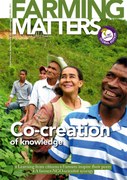A platform of farmers, retailers and service providers,civil society organisations, NGOs, government officials, and researchers improves livelihoods in Rwanda. Through interaction and collaboration, these groups experiment with various technological and institutional innovations, thereby tackling local agricultural challenges. This experience illustrates the importance of institutionalising a space where knowledge can be co-created.

The high altitude hills and cooler temperatures of the Great Lakes Region of Central Africa provide the ideal conditions for agriculture. However, population pressure and years of civil conflict have caused soil exhaustion and limited the availability of spare land, as well as paralysed agricultural advisory and extension services, resulting in poor access to markets. Not surprisingly, farm households in parts of this region rank among the most food insecure and malnourished in the world. Although there is great uncertainty about the type of solutions that will effectively solve these problems, it is clear that developing, testing, and implementing these solutions require collaboration between several groups of stakeholders.
Collective action
To facilitate this collaboration, ‘multi-stakeholder innovation platforms’ (IPs) started in 2013 in Rwanda as part of a larger research-for-development programme called Humidtropics. An IP is a space for learning and change. It is a group of individuals with different backgrounds and interests. The objective of these IPs is to facilitate knowledge co-creation through joint problem analysis, priority setting, testing of innovations, and learning. To start off, (inter)national agricultural research organisations, together with the government and development partners, identified sites in the Great Lakes Region with agricultural potential to improve livelihoods and market opportunities, and to reduce land degradation. In Rwanda, for example, a small team of Humidtropics and government researchers together with a representative of the national peasant organisation decided to focus on Kadahenda, in the north of the country. There, they teamed up with local authorities and different farmer groups. They identified opportunities to boost agricultural production in the region, and decided that improving the quality of and access to potato (Solanum tuberosum) seed would be a good starting point.
A journey starts
In February 2014, a group of Kadahendan farmers, representatives from government and the private sector, as well as researchers and NGOs came together to take this further. After discussing concrete research and development activities, such as testing different potato varieties, intercropping, and pest and disease control, the first community IP was launched. The members of this IP were involved in the selection of the varieties and designing the activities. Volunteer farmers conducted trials on their land, while government and research organisations provided inputs such as seeds and management advice. To support the community level IPs, a national level IP was established to provide science advice and services. Despite the initial enthusiasm, however, the young IP did not manage to get any potato seed into the ground because the involved organisations did not manage to mobilise resources to do so.
Solving problems, growing confidence
To address this problem, Humidtropics provided ‘platform-led innovation funds’. What was special about these funds was that the members of the IP could decide how to spend them. From that moment on, the intensity of activities in Kadahenda increased. Community IP members started meeting whenever they felt there were problems that required a group discussion. Slowly but surely, IP members in Kadahenda gained faith in the platform, and farmers helped one another planting and harvesting, and shared problems and their potential solutions with the whole group. Additionally, experienced farmers assisted new members to become familiar with the IP and its activities.
Despite the growing confidence, challenges kept emerging. This demanded even more collaboration and problem solving by IP members. One of these challenges related to the farmer’s lack of access to manure. To address this problem, farmers decided to set up a system among themselves in which each farmer IP member paid 1.3 USD monthly. With this money, the group bought a sheep that was given to one of the members. Each month, another member received a sheep and, once the sheep reproduced, the lamb was given to another IP farmer.
In order to evaluate the collaboration process, community and national IP reflection meetings were organised at the end of each season. During these meetings, specific research or development activities were abandoned or adopted, depending on the reflections and the changing priorities of the IP members.
Looking back
Almost three years after their inception, some lessons have been learned regarding the performance and impact of IPs for knowledge co-creation. Putting resources in the hands of stakeholders enabled them to steer the research and development agenda, and to implement activities that no other projects or businesses were able to support. Having IPs at the local and national levels can bridge different innovation processes. Addressing communitylevel barriers (e.g. access to land, inputs, credit, and markets) often requires change at higher policy levels. The regular IP reflection meetings stimulated short-loop learning and timely adaptation of research and development activities to support collective action. The experience here shows that community level IPs can provide the space necessary for different types of knowledge, experiences, skills, resources, and attitudes to come together and co-create innovation. However, collaboration between different groups of stakeholders across different levels is also difficult. People have different interests, needs and objectives that sometimes clash. We are continuously learning about what works and what does not work as we move along.
Marc Schut on behalf of the of the CIALCA / Humidtropics East and Central Africa Team*
Marc Schut (m.schut@cgiar.org) is responsible for coordinating the social science activities for the Humidtropics research programme. For more about this initiative see: Schut et al. (2016) in Experimental Agriculture, http://dx.doi.org/10.1017/S001447971500023X.
This article was written on behalf of the CIALCA / Humidtropics East and Central Africa Team: Chris Okafor, Cyrille Hicintuka, Sylvain Mapatano, Desire Kagabo, Emmanuel Njukwe, Solange Zawadi, Dieuwke Lamers, Pierre Celestin Ndayisaba, Mariette McCampbell, Murat Sartas, Piet van Asten and Bernard Vanlauwe (http://www.cialca.org / http://www.humidtropics.org).


